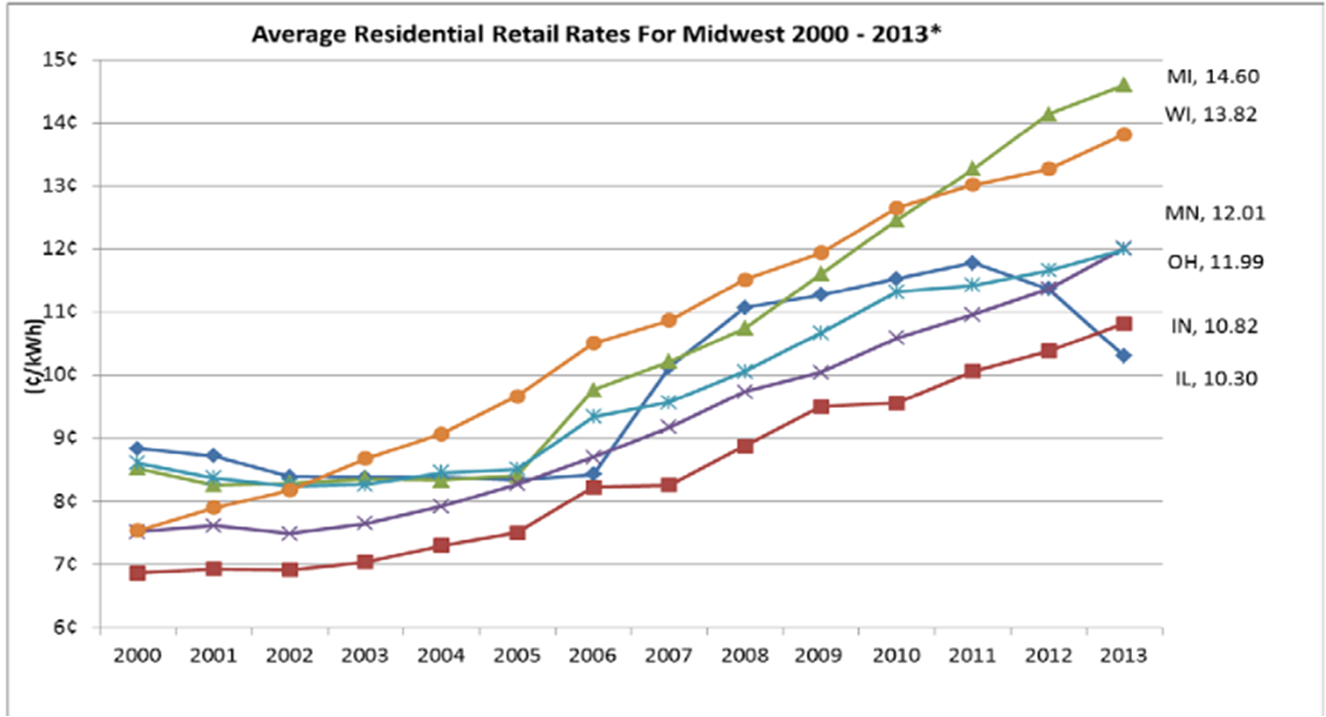Michigan: Electricity Price per Kilowatt-Hour Explained
The cost of electricity is calculated based on the kilowatt-hour (kWh) in Michigan. A kilowatt-hour is about the amount of electricity needed to run your dishwasher. But what factors make up a kWh? The price of a kilowatt-hour is made up of a number of costs related to generating and delivering your electricity. Things like demand have a direct impact on prices, and your price per kWh can vary from one minute to the next.
Even though it can change many times a day, the cost of electricity per kWh is regulated for most consumers by the Michigan Public Service Commission (MPSC). Prices vary based on whether you have an Alternative Electricity Supplier (AES) or a traditional utility company.
How Do Michigan's Prices Compare?
The price of electricity per kWh varies over time, but costs in Michigan are currently above the national average. Michigan's average electricity price is also higher than all five neighboring states.
Michigan's average electricity cost per kWh is 13 cents according to NPR, ranking it at 35th in the United States, and above the national average of 12 cents per kWh.

What Costs are included in the Price of Electricity per kWh?
The price of electricity per kilowatt-hour in Michigan is divided up into two main categories: supply & delivery charges.
Final electricity charges are regulated by the MPSC for every traditional utility company.
Supply Charges
Supply charges cover all the costs associated with generating electricity and transmitting it to your utility, and they vary based on the amount of electricity you consume. These charges vary based on the time of year, and even the time of day, when higher demand for electricity can increase the cost of generation. Your supply charges are also directly affected by changes in the real market price of electricity.
Delivery Charges
Delivery charges, also sometimes known as distribution charges, cover all the costs associated with delivering electricity. Specific charges may vary by utility company. For example, Consumers Energy includes an "Energy optimization charge" in this category, to help recover costs associated with complying with green energy laws.
Operating Costs
The cost of electricity per kWh also covers operating costs, including things like customer service and meter readings. Updates to infrastructure and repairs may also be included on the delivery or supply sections of your monthly bill.
The Effects of Weather
Weather can impact demand, as extreme heat or cold can increase electricity needs. Higher demand can increase the cost of generation, transmission, and delivery, but it can also impact the real market price of electricity. Severe weather events can also damage infrastructure, causing maintenance and repair charges to increase.
Are Electricity Prices Regulated in Michigan?
Price per kilowatt-hour rates must be approved by the Michigan Public Service Commission (MPSC) through a process called the Rate Case. Traditional utility companies must support their demand for an increase, and hearings are open to the public who can also testify.
Some electric cooperatives may choose to have rates regulated by members, and so they are not subject to the same protections. Rates for Alternative Electricity Suppliers (AES) are not regulated.
How Have Michigan's Electricity Prices Changed Over Time?
In 2000, Michigan launched the Electric Customer Choice Program, giving consumers the right to choose an alternative electric supplier. The program was created to deliver lower electricity prices to Michigan residents, based on increased competition between suppliers. Prices improved until the real market price of electricity spiked in 2006. Michigan lawmakers passed PA 286 in 2008, restricting access to alternative electricity suppliers to 10% of total retail sales. Eventually this legislation reversed the gains for Michigan's electricity prices.

The state of Michigan has the highest electricity rate per kWh in the nearby six state region. Michigan lawmakers are currently considering House Bill 5184 legislation to give more Michiganders the right to electric choice and hopefully deliver some relief.
The Future of Prices per Kilowatt-Hour in Michigan
The cost of electricity per kWh is always changing, since supply and delivery charges fluctuate. Though Michigan's government regulations have helped to protect residents from price shocks, the state's average electricity price is still the highest in the Midwest region and above the national average. Efforts to liberalize Michigan's energy markets have been limited, but pending legislation offers the opportunity for more electricity price improvement in the future.
